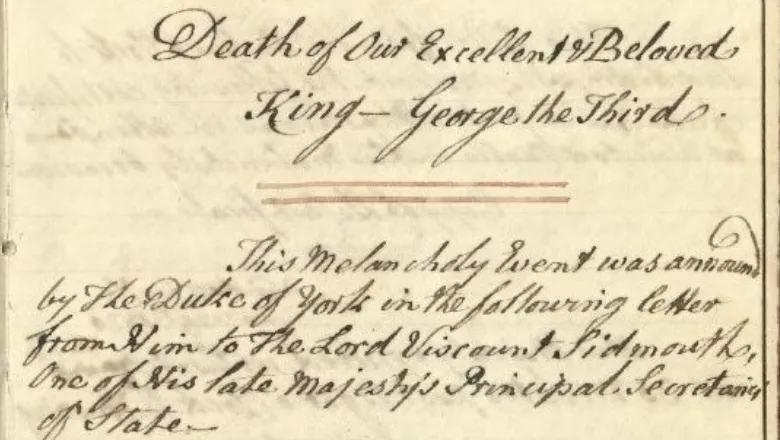The Queen’s death was understood to be a blow to the king, though by even public accounts he would not understand his loss.
Professor Karin Wulf, Executive Director of the Omohundro Institute
29 January 2020
The Georgian Papers Programme commemorates the 200th anniversary of King George III's death
GPP marks the 200th anniversary of King George III’s death with the release of three new blogs offering fresh insights into the King’s funeral, responses to his death and commemorative medals.

On this day, two hundred years ago, 29 January 1820, the longest-ruling King in the history of Britain, King George III died at the age of eighty-two and into the fifty-ninth year of his reign. The King’s death came at the end of a long period of decline, which commenced following the return of his mental illness when his beloved daughter Amelia died in 1810 from tuberculosis. In 1811 his son George was formally proclaimed Prince Regent, and the King ceased to play any role in public life, passing his final years in seclusion at Windsor blind and often in a fantasy world recorded in daily bulletins by his doctors.
Now, 200 years later, these same bulletins are available for all to read for the first time as part of the Georgian Papers Programme (GPP). As well as this, GPP is publishing two blogs by the academic directors of the programme, Professor Arthur Burns (King’s College London) and Professor Karin Wulf (Executive Director of the Omohundro Institute) with a third blog released by Mount Vernon historian and GPP fellow, James P. Ambuske.
In her blog, Professor Wulf reflects on the King's funeral, which was just one of a series of such royal occasions in the later 1810s, and that of Queen Charlotte who predeceased him by two years.
Professor Burns in collaboration with Liam Fitzgerald explores the striking series of commemorative medals issued to mark the King’s death. This year, the Royal Mint itself has released a commemorative £5 coin celebrating the reign of King George III for which the GPP advised on accompanying documentation.
In many ways this is a very appropriate way to mark the anniversary, for the King’s death itself prompted the issue of several commemorative medals.
Professor Arthur Burns discusses the release of the commemorative £5 coin
In his blog, James P. Ambuske reflects on Thomas Jefferson’s memories of his former sovereign, highlighting how the death of the King was news on both sides of the Atlantic.
What Jefferson felt upon learning of George III’s death in the spring of 1820 is uncertain. Perhaps he quietly acknowledged that another member of the revolutionary generation had passed away.
James P. Ambuske, former GPP Fellow and Mount Vernon Digital Historian
Alongside the newly published bulletins, the Royal Collection Trust is also launching a new website, Military Maps, which brings King George III's extraordinary collection of more than 3,000 military maps, views and prints for public viewing. The website provides remarkable insight into the art of warfare and mapping and is the culmination of ten years of research by Dr Yolande Hodson.
The next major Georgian papers event to be held at King’s College London is the annual Sons of the American Revolution Georgian Papers Programme Lecture, which will be delivered by the distinguished Harvard historian Professor David Armitage on 17 March 2020. The theme of the lecture is George III and the Law of Nations which draws on remarkable documents in the Georgian papers and explores how George III’s education in constitutional and juridical knowledge shaped his understanding of international relations, the American Revolution and the abolition of slavery. These documents reveal George III as an unusually thoughtful, engaged, and at times surprisingly radical student of the changing nature of sovereignty in an age of revolutions.
The lecture is free and open to all to attend, tickets are now available at Eventbrite.
About the Georgian Papers Programme
The GPP is a 10-year interdisciplinary project to digitise, conserve, catalogue, transcribe, interpret and disseminate 425,000 original pages in the Royal Archives and Royal Library relating to the Georgian period, 1714- 1837. GPP is a partnership between the Royal Collection Trust and King’s College London and is joined by primary United States partners the Omohundro Institute of Early American History & Culture and William & Mary. Other key institutions participating in the GPP include the Library of Congress, Mount Vernon and the Sons of the American Revolution.
Visit the Georgian Papers Website: www.georgianpapers.com

